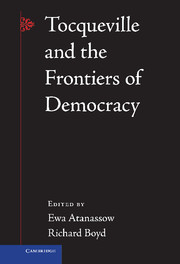Book contents
- Frontmatter
- Contents
- List of Contributors
- Short Title Abbreviations of Tocqueville's Major Works
- Acknowledgments
- Introduction: Tocqueville and the Frontiers of Democracy
- Part One The Meaning of Democracy and the Democratic Revolution
- Part Two Democratization in a Non-Western Context
- 4 Tocqueville and Religion: Beyond the Frontier of Christendom
- 5 Deliberating Democratization with Tocqueville: The Case of East Asia
- 6 Tocquevillean Thoughts on Higher Education in the Middle East
- Part Three Challenges of Globalization: Democracy, Markets, and Nationhood
- Part Four Democracy, Imperialism, and Foreign Policy
- Part Five Democracy's Old and New Frontiers
- Epilogue: New Frontiers, Old Dilemmas
- Bibliography of Works Cited
- Index
- References
6 - Tocquevillean Thoughts on Higher Education in the Middle East
Published online by Cambridge University Press: 05 April 2013
- Frontmatter
- Contents
- List of Contributors
- Short Title Abbreviations of Tocqueville's Major Works
- Acknowledgments
- Introduction: Tocqueville and the Frontiers of Democracy
- Part One The Meaning of Democracy and the Democratic Revolution
- Part Two Democratization in a Non-Western Context
- 4 Tocqueville and Religion: Beyond the Frontier of Christendom
- 5 Deliberating Democratization with Tocqueville: The Case of East Asia
- 6 Tocquevillean Thoughts on Higher Education in the Middle East
- Part Three Challenges of Globalization: Democracy, Markets, and Nationhood
- Part Four Democracy, Imperialism, and Foreign Policy
- Part Five Democracy's Old and New Frontiers
- Epilogue: New Frontiers, Old Dilemmas
- Bibliography of Works Cited
- Index
- References
Summary
Anyone who has read Democracy in America will have noted its rather bold claim that the movement toward equality is something “fated” and that this movement amounts to the supplanting of one human type, namely “aristocratic man,” with another type, namely “democratic man.” At times Tocqueville writes that this movement pertains to the Christian lands, at times to the civilized world, and at times to the entire world. And although he did write about other places, his focus was the transformation taking place in Europe and in America – that land to the west where Europeans could in some measure see the two sorts of equality – equality in freedom, or equality in servitude – that might await them in the future.
Tocqueville scholarship has, accordingly, focused largely on his writings about Europe and America. During the Cold War, Tocqueville's work was brought to bear on the question of American exceptionalism, a term that nowadays is often taken to mean American uniqueness but that at the time meant something else: whether the lack of class relations in the United States of the kind that predominated in Europe meant that the claim about the historical inevitability of communism might not apply in the American case. With the fall of the Berlin Wall, another wave of Tocqueville scholarship attended to the question of whether the mediating civic institutions about which he wrote might be able to be instantiated in lands now without political compass. Among political theorists, on the other hand, Tocqueville's writings have largely been seen through the lens of the field's central question, viz, what is the origin, nature of, and prospect for “modernity” – a word Tocqueville never uses but that notion lurks in all that he writes.
- Type
- Chapter
- Information
- Tocqueville and the Frontiers of Democracy , pp. 133 - 150Publisher: Cambridge University PressPrint publication year: 2013
References
- 1
- Cited by

